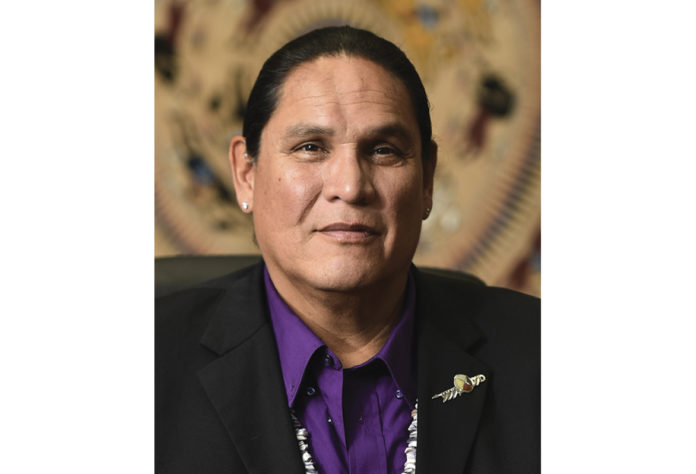by Ernest L. Stevens
As we stand on the brink of one of the most critical election cycles in U.S. history, the Indian Gaming Association (IGA) is helping to mobilize an unprecedented voter registration campaign for Native Americans.
With the 2024 National Elections approaching, our mission (in partnership with various sister organizations), is to ensure that every Native American is registered and prepared to embrace their civic duty and exercise the sacred right to vote – a right fought for valiantly by our ancestors.
IGA is a nonpartisan organization dedicated to advocating for the voices of Indian Country. Just like in previous election years, it is my responsibility to attend both the Republican and Democratic National Conventions. Recent developments in both conventions have shown that it is imperative that Native American perspectives are represented in political conversations. Tribal leaders play a crucial role in articulating the unique interests of Indian Country, ensuring our issues resonate in the chambers of power.
Through consistent dialogue with government leaders, IGA aims to advocate for tribal sovereignty and educate decision-makers about the pressing concerns facing our communities. This ongoing engagement is not just important; it is vital for the preservation of our rights and the welfare of our people.
Indian gaming revenues have reshaped the economic landscape for tribal nations over the past four decades, enhancing the lives of tribal citizens and their communities.
By law, tribal governments are mandated to reinvest gaming revenues back into their local economies, providing crucial funding for education, healthcare, public safety, and infrastructure. This reinvestment not only supports economic growth but also affirms the power of tribes to exercise their sovereignty and uphold treaty rights. The recent report from the National Indian Gaming Commission showing a record gross gaming revenue of $41.9 billion for fiscal year 2023 highlights our collective strength and economic significance, underscoring the importance of having our voices heard in political arenas. The impacts are tremendous as Indian gaming stands as one of the largest private employers in the country, creating hundreds of thousands of jobs for American families, further reinforcing the mandate for the federal government to address the pressing needs of Indian Country.
As citizens of federally recognized tribes, it is our responsibility to engage with and educate members of Congress and all candidates about their legal and moral obligations to tribal nations. The future of our communities depends on our active participation. We must ensure that the decision-makers who are ultimately placed in power – understand and respect our unique status as sovereign nations. In this election year, we must focus on electing policymakers who genuinely commit to upholding the federal government’s treaty and trust obligations to Indian tribes.
The upcoming general election on November 5th presents a unique opportunity for Native citizens to impact who will serve our nation as the next President and key members of the Senate and House of Representatives. The implications of this election will reach far into the future of our communities.
Voting is more than a privilege; it is a fundamental duty that epitomizes our rights as American citizens. It is a solemn responsibility, rooted in the struggles and sacrifices of our ancestors, who fought for our rights, including the right to choose our leaders. In Indian Country, exercising our right to vote not only advances our policy goals, but pays homage to those who laid down their lives to protect our sovereignty for future generations.
Historically, Native Americans were denied the right to vote until the Indian Citizenship Act of 1924. Before this, policies such as assimilation, government-run boarding schools, and termination were enacted without input from Native peoples. This historical context reinforces the need for us to make informed decisions and engage in the democratic process today.
Youth engagement is particularly essential as we approach the 2024 elections. By educating and inspiring younger generations of Native voters to participate actively in elections, we contribute to a stronger, more empowered electorate. The growing awareness and participation we witnessed in the 2020 elections, where approximately 80 percent of eligible Native American voters cast their ballots, showcased our potential to influence outcomes significantly.
As Election Day approaches, it is crucial to recognize that Native American voters have the power to demand accountability and affect critical policy decisions. The election of more Native American representatives within Congress and state legislatures can foster a sense of hope and motivation among younger voters, encouraging increased engagement and participation in the political process.
In this election season, IGA remains steadfast in its commitment to highlighting the importance of voting. Regardless of one’s political affiliations – be it Republican, Democrat, or Independent – we urge you to take an active role in engaging with candidates, developing policy proposals, and electing those who prioritize the interests of Indian Country and tribal sovereignty.
Ultimately, the power we wield at the polls dictates whose voices will echo in Congress, the White House, and local and state governments. Let us join together to ensure that every vote counts and every tribal citizen registers to make their voice heard. Now is the time for Indian Country to unite and make a difference.
As the U.S. approaches the 2024 elections, our Native American presence, insights, and participation are pivotal in shaping outcomes in critical battleground states. Our voices deserve to be heard, and our votes hold the power to catalyze change, secure our rights, and bring overdue recognition to our contributions to the nation. The future lies in our hands – let’s embrace this moment and ensure our collective voice resonates loud and clear.
Ernest L. Stevens, Jr. is Chairman of the Indian Gaming Association. He can be reached by calling (202) 546-7711 or visit www.indiangaming.org.















































